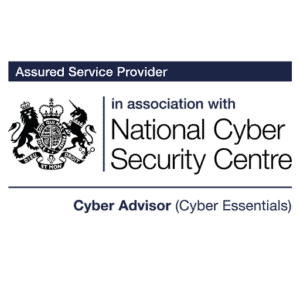Cyber Awareness Training: Your First Line of Defence
22nd Aug 2025
Talk to our experts today
22nd Aug 2025
In a world where ransomware, phishing, and social engineering dominate the cyber threat landscape, one thing is clear: technology alone isn’t enough.
Despite significant investments in cyber defences, the vast majority of security incidents still begin with human error. Clicking a link. Reusing a password. Trusting the wrong email.
These mistakes are rarely malicious – but they’re consistently costly.
The truth is, your people are either your weakest link or your strongest line of defence. And that depends on whether they’ve been trained.
According to the UK Government’s Cyber Security Breaches Survey 2025, the cyber threat is as real as ever.
Real-world phishing attacks are escalating. In 2025 alone, we’ve seen £47 million stolen from HMRC accounts, UK Home Office sponsorship systems exploited, and everyday users targeted by scams impersonating Google and Spotify – some of which have been able to drain victims’ bank accounts in a matter of seconds.
Despite widespread awareness of cyber threats, only 33% of businesses provide regular cyber awareness training, leaving the majority of organisations inadequately equipped to prevent cyber breaches resulting from human error. The data reveals a worrying mismatch between the source of breaches and the preparedness of staff.
It’s easy to assume your team would recognise a phishing email or know how to handle a suspicious request. But would they?
Ask yourself:
If even a portion of your team would hesitate to answer “yes”, you may be more exposed than you think.
Many organisations only discover these knowledge gaps after an incident has occurred. But by then, it’s too late.
When cyber awareness is low, the cost of a single click can be enormous.
Let’s consider a common scenario:
The breach is eventually discovered – but not before significant damage is done.
The implications can include:
And perhaps most critically – your customers and partners may lose trust.
Technical controls are vital. But they can’t prevent someone from:
These behaviours account for the majority of successful cyber incidents. Which means your cybersecurity strategy is only as strong as your team’s awareness.
The latest threat reports show that attackers are increasingly targeting people not systems. Phishing attacks are more personalised. Social engineering is more convincing. And once a foothold is gained, the damage escalates quickly.
Cyber awareness training isn’t just a compliance exercise – it’s a cultural shift.
Done right, it builds a workplace where everyone feels responsible for cybersecurity and confident in their role within it.
Here’s what effective training delivers:
Staff learn how to recognise phishing, avoid unsafe behaviours, and report threats quickly and confidently.
Training is adapted to the realities of your business. A finance officer will learn different tactics than a customer service rep – because attackers tailor their approach too.
One-off workshops won’t cut it. Ongoing training, supported by testing and updates, builds lasting awareness and behavioural change.
Meets requirements under Cyber Essentials, ISO 27001, GDPR, and other frameworks. Demonstrates due diligence to regulators, partners and insurers.
A well-informed workforce isn’t just harder to breach – it’s faster to respond. Awareness training reduces the chance of mistakes and increases the speed of recovery when incidents happen.
In many cases, the difference between a near-miss and a full-blown breach is simply that someone knew what to look for, and what to do next.
That’s the value of cyber awareness training. It equips your team with the confidence, clarity, and readiness to act – before a threat turns into a crisis.
Cybersecurity isn’t a one-time project. It’s a mindset – and one that needs to be nurtured across the organisation.
Now is the time to act. Book your free demonstration today and see why our affordable, market-leading cyber awareness training is trusted by businesses nationwide.
Protect your business with confidence. At Assure Technical, we deliver engaging, practical and accessible training programmes that empower your people without overwhelming them. Give your team the knowledge to spot threats before they become costly breaches.
Whether you’re aiming for Cyber Essentials certification, improving incident readiness, or responding to a recent close call, we’ll help you build a programme that works and lasts.
Get in touch with our expert consultants for straight-talking, jargon-free technical security advice.













